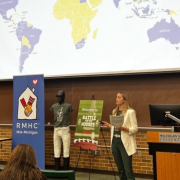Researcher Discovering Secrets Behind Human Behavior

By Genevieve StJean
While some researchers use vials and chemicals, Morgan Ellithorpe studies something a little
closer to us: human behavior. To be more specific, she looks how the media impacts behavior, attitudes and health.
Ellithorpe, an assistant professor in the Department of Advertising + Public Relations,
researches media psychology, which according to her is “The way we select, process and are affected by the media.”
Some of the questions she is trying to figure out through research include how binge watching affects health, if media will influence risky behaviors in adolescents, how minority groups are portrayed in the media and how the entertainment industry markets diverse casts.
However, Ellithorpe didn’t start out knowing this was exactly what she wanted to investigate.
“I started out being interested in representation of disability in media, because I have a brother who has cerebral palsy,” said Ellithorpe. “That expanded during graduate school to representation of all underserved groups. The health focus really came out of my post-doc, and I found it a really great combination of my interests because a lot of health communication and health in media has a disparities aspect.”
This type of research does come with its own challenges. “Human behavior is very squishy. It’s difficult to predict, and there are a lot of factors involved. You have to know how things like prior experience may impact people’s behavior and attitudes,” said Ellithorpe.
For Ellithorpe, answering one research question usually raises more questions to answer — which leads to her next research project.
For example, she was investigating how media impacts racist attitudes and discovered that there were differences in genre exposure in regards to attitudes toward African Americans. Ellithorpe’s research showed exposure of African Americans in news and sports were associated with increased racism, while exposure in sitcoms was associated with less racism. The next logical question was: why?
Ellithorpe and her colleagues found reciprocity as a potential reason. “Positive reciprocity is if I help you, you’ll help me in the future. Negative reciprocity is if I do something to harm you, then you’ll retaliate. Sitcoms give positive feelings of reciprocity: characters are interacting in positive ways. In the news, African Americans are over-represented in crime news, increasing negative reciprocity beliefs,” said Ellithorpe.
Another aspect of this topic that Ellithorpe is studying is how diverse programming is marketed. In the past, the entertainment industry has marketed films with diverse casts to their specific audiences. This doesn’t need to be the case.
Ellithorpe said, “I would encourage people to go see those type of films and encourage people who are going into entertainment marketing to try to not to fall into the trap of only marketing the diverse content to the specific subgroups that are represented.”
On top of uncovering a lot of questions about media and behavior, Ellithorpe also teaches several classes at both the undergraduate and graduate levels. Her research does influence how she teaches her classes.
She also encourages her students and other undergraduates to become involved in her labs. Ellithorpe hopes her research gives insights to help people better understand the relationship between the media and human attitudes and behavior.














